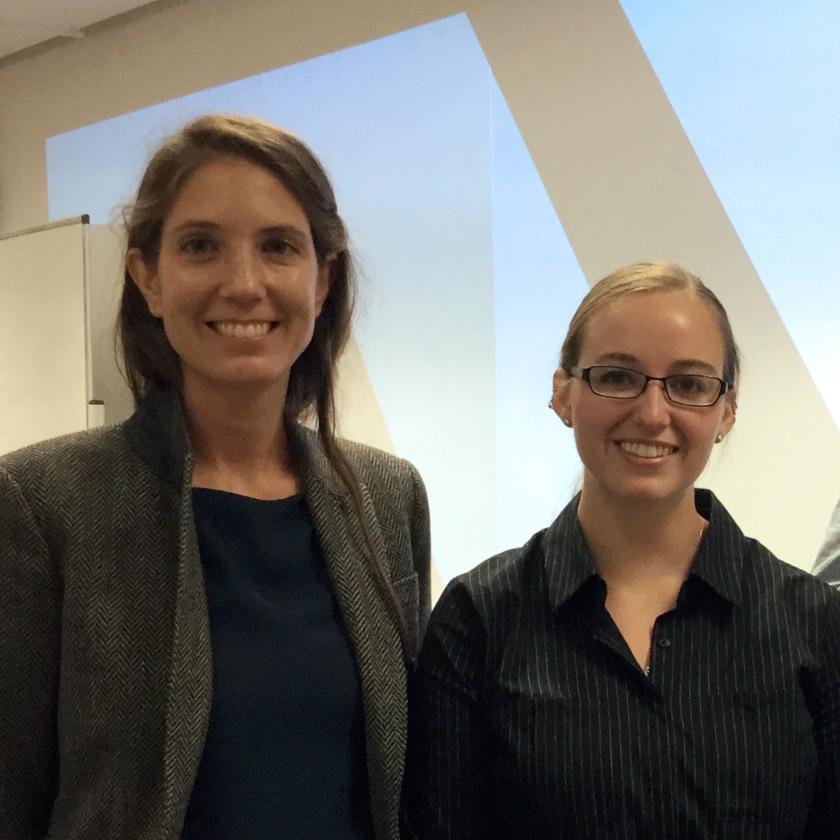
Two iSchool master's students undertook placements at Oxford University this summer and presented their work at a seminar earlier this month. The placements were part of the Oxford-Illinois Digital Library Placement Program, an ongoing collaboration between Illinois and Oxford. Catherine Blauvelt (MS '16) and Alex Kinnaman spent six weeks at the Oxford e-Research Centre and Bodleian Libraries, respectively.
The program is a collaboration between the Centre, Bodleian Libraries, and the iSchool, and is now in its third year. Kevin Page, the Centre's coordinator for the program, and Pip Willcox, head of the Centre for Digital Scholarship and the Bodleian's coordinator for the program, work closely with the students on specific projects during their placements, which also includes attendance at the popular Digital Humanities at Oxford Summer School.
Blauvelt explained her work with the Semantic Alignment and Linking Tool (SALT), which was developed by the Centre's David Weigl to help users of complementary datasets to establish connections between them even when they lack common identifiers. SALT aligns datasets that would otherwise be difficult to compare by generating possible match candidates for the user to confirm or dispute. Blauvelt's project focused on redesigning and extending the SALT user interface to make it more user-friendly by incorporating computational features from other tools such as an audio key detector from the Fusing Audio and Semantic Technologies (FAST) project and text features from the Workset Creation and Scholarly Analysis and Data Capsules (WCSA+DC) project. User evaluations and suggestions made by musicologists were at the forefront of the redesign process. The main concerns raised during the evaluations were readability, repetition, the number of clicks necessary during certain processes, and that matches made in error couldn't be deleted.
The process by which users can confirm or dispute matches suggested by the tool (such as the same tempo in different songs, or the same composer of two pieces of music) has now been streamlined, and matches created in error can be deleted by the user. Further development of visualization features will mean that users can choose how to view each feature by graph type and axes description, and users will be able to customize the tool by selecting the parameters which constitute a match. Although the tool has been developed using early music datasets with feedback from expert musicologists, it is designed to be transferable for use with other datasets.
Blauvelt, who has now completed her degree and will soon be starting work as collections manager of French literature at the New York Public Library, described her time at the Centre as "an amazing experience" and "very empowering." "It was particularly beneficial to use programming languages learned in the classroom in a real-world situation, and to take part in the Digital Humanities at Oxford Summer School with so many experts in the field," she said.
Kinnaman described her work at the Bodleian with electronic dark archive pilot project Digital Safe, which looks at the requirements and feasibility of providing a long term storage solution for sensitive electronic information throughout the collegiate university. She worked closely with Michael Popham, head of digital preservation, and Neil Jefferies, head of research and development, in the Bodleian Digital Library.
At Oxford, each college and department currently has their own infrastructure and methodology for storing confidential and valuable archives. The project, whose initial phase started in 2012, first sought to establish whether there was a need for a university-wide long term, high security, and trusted repository for content such as personnel, financial, medical, and personal records. Having established the need, the decision was made to outsource the technology but manage it locally. Arkivum, which provides long term data storage with high security and audit trails and Archivematica, a digital preservation system, were selected for the archive's development.
Kinnaman's placement project focused on conducting a comprehensive audit of Digital Safe using the Trustworthy Repositories Audit & Certification: Criteria and Checklist (TRAC) tool. She reviewed the archive system in terms of governance and infrastructure, digital object management, and technologies and security. TRAC was used for guidance rather than a formal audit as not all the criteria were relevant, being better suited to open access repositories with content already uploaded rather than a dark archive at pilot stage. Phase three of the Digital Safe project will involve training early adopters within the university and testing the model with archivists and administrators.
Kinnaman is returning to her final year of study for her degree and said of the placement, "It was incredibly valuable in terms of project planning experience and communicating with a wide range of people. The team I worked with were very supportive and helpful."
The students' projects this year were supported by the EPSRC FAST project at the Centre, the Bodleian's Polonsky Digital Preservation Fellowships project, and the Mellon-funded Workset Creation for Scholarly Analysis (WCSA+DC) project at Illinois, in which the Centre also collaborates.
Blauvelt and Kinnaman will each write up their projects as posters (coauthored with Oxford academics) for submission to iConference, the annual conference of the iSchools consortium.